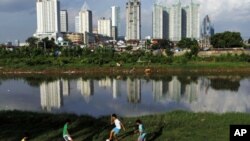Indonesia is promoting itself as one of Asia’s best investment opportunities, with steady economic growth, a maturing democracy and a growing middle class eager for consumer goods.
Indonesian President Susilo Bambang Yudhoyono told more than 300 potential investors Wednesday that patience, diligence and persistence are key to tapping into Indonesia’s booming economy.
After several years of steady, six percent economic growth, Mr. Yudhoyono says that the country is ready for foreign investors.
"We still have to grapple with lots of challenges, poverty, corruption, bureaucratic bottlenecks, inefficiency and infrastructure development,” Mr. Yudhoyono stated. “We also very much aware of our weaknesses and shortcomings. Do not believe those who say we are slowing down, for I am determined to ensure that by the end of my term in 2014 we will achieve what may be remembered as Indonesia’s transformational decade."
Indonesia’s government has worked hard to implement prudent fiscal measures in the wake of the 1997 Asian financial crisis that sent investors fleeing. Concerns about security following several terrorist attacks over the last decade have also eased.
The International Financial Corporation ranked Indonesia 121st out of 183 countries in ease of doing business in 2010. But tax breaks for investors and international certification for products such as timber are helping create new business incentives.
Those advances helped lure investors to the Overseas Private Investment Corporation summit in Jakarta. OPIC is a U.S. government agency that supports private investment in emerging nations by providing loans and insurance to U.S. businesses looking to expand abroad.
Many of those in attendance say they’re eager to take advantage of the world’s next biggest market behind China and India.
Stuart Dean, the head of General Electric’s Southeast Asian operations, says fast growth, a large population and desire to develop are all to his company’s advantage.
"This is an archipelago, they’re going to be building at least 25 new airports in this country,” Dean said. “They’re obviously going to need a lot more aircraft. And, by the way, a lot more GE aircraft engines to fly those planes. So there are some really big opportunities for a company like GE here."
GE already has more than $1 billion in assets and investment in Indonesia and is making geothermal development one of its main priorities.
Many of the attendees at this week’s OPIC summit want to take advantage of renewable energy and infrastructure deals. Indonesia plans to overhaul its dilapidated rails, roads and port, and it is relying on foreign investors to supply nearly $150 billion for infrastructure development over the next three years.
President Barack Obama first spoke of the need to strengthen trade and investment ties with Indonesia during his visit to Jakarta last November. The United States is currently Indonesia’s third-largest foreign investor behind Singapore and Britain, but Obama said it wants to be number one.
Some say U.S. interest in Indonesia stems from an effort to balance China’s rising influence in the region. Chinese premier Wen Jiabao recently committed $9 billion to infrastructure development here.
Elizabeth Littlefield, the president of OPIC, says the U.S. motives are more pragmatic.
"We’re looking to support U.S. business. We think Indonesia has plenty of opportunities for everyone. This is not about a competition; this is about wanting to make sure that we’re helping Indonesia to prosper with the support of U.S. businesses," she said.
President Yudhoyono invited investors to take advantage of changing demands by looking beyond resource industries like oil and mining to manufacturing and services. He also asked for assistance in development programs aimed at reducing poverty and building entrepreneurship.
With China and India having recently committed tens of billions of dollars to Indonesia’s development, Yudhoyono urged U.S. investors to "discover" the country. His advice was straightforward: stay for the long-term, find a good local partner, invest in people and remain patient and persistent.




